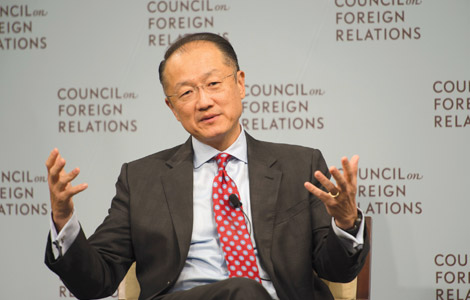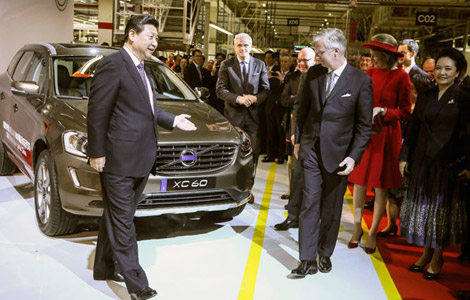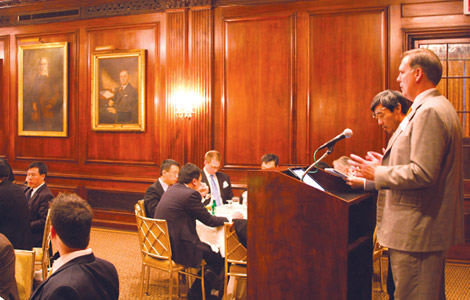China's FDI into US zeroing in on high-tech sector: report
Updated: 2014-04-02 10:53
By Jack Freifelder in New York (China Daily USA)
|
||||||||
The two major goals currently driving Chinese investment into the US high-tech sector are increased market share and financial return, but the trading relationship is not without thorns, according to a new report from the Rhodium Group.
"Foreign direct investment (FDI) is generally understood to be a net positive for recipient countries," the April 1 report , entitled HIGH TECH: The Next Wave of Chinese Investment in America, said. "Most countries not only keep their doors open to FDI, but actively promote the inflow of foreign capital.
"At the same time, there are potential negative economic and political impacts from FDI," the report said.
Opportunities for Chinese investors remain in China, but technological advances are drawing a number of investors to the US, according to Douglas van den Berghe, CEO of independent FDI advisory group Investment Consulting Associates (ICA).
"The Chinese market is still huge for Chinese investors back home," Berghe said. "Nevertheless, what some of the Chinese firms are missing is the superior technology that the US multinationals have."
Chinese investors are getting access to superior proprietary technology that has been built up in an innovative environment, Berghe said. "The rationale behind the trend is that Chinese firms want to have access to technology and innovation in the US, which they don't have back at home," he said.
Barry P. Bosworth, an economist with the Brookings Institution in Washington, said he was not surprised by the report's findings.
"There has been a long tradition of foreign firms using FDI in the US to learn about new markets and technologies," Bosworth said on Tuesday in an email to China Daily. "China is simply following that trend."
Chinese investment in the US doubled to $14 billion in 2013, according to data from the Rhodium Group, but investors have announced high-tech deals worth more than $6 billion in the first quarter of 2014 alone.
The group forecasts "China's [outbound] FDI stock will grow" from $500 billion currently to an amount between $1 trillion and $2 trillion by 2020.
Significant deals made by Chinese investors earlier this year include the takeovers of Motorola Mobility, IBM's x86 server unit and electric carmaker Fisker Automotive.
While China's arrival as a technology investor brings benefits to the US, it also reinforces concerns - particularly at a time of difficult US-China relations.
Bosworth said while the trade relationship has brought benefits to both sides, the US and China are "polar opposites" when it comes to the issue of patent and property rights.
"There are concerns for some American firms, but I think the big issue is intellectual property rights," Bosworth said.
"Patents have increasingly become a tool of warfare among large corporations, to the detriment of competition and consumers."
Berghe said the rationale guiding Chinese FDI has changed over time.
"The main question is what does the global economy want," Berghe said. "We don't want protectionism, but what share of the cake is the rest of the world getting from Chinese outward investment?"
"There's a difference between the types of outward foreign investment that we have seen over the last 50 years, and the direction behind the current trend is proprietary technology," he said.
jackfreifelder@chinadailyusa.com
|
Pactera's US headquarters in Redmond. High-tech US firms are attracting more Chinese FDI. Linda Deng / China Daily |
(China Daily USA 04/02/2014 page3)

 China's FDI into US zeroing in on high-tech sector: report
China's FDI into US zeroing in on high-tech sector: report
 World Bank to bolster fight on poverty, inequality
World Bank to bolster fight on poverty, inequality
 Trip builds bridge to Europe
Trip builds bridge to Europe
 Massive earthquake hits Chile
Massive earthquake hits Chile
 Venezuelan anti-govt protestors set on fire in rally
Venezuelan anti-govt protestors set on fire in rally
 Sino-US relations going mainstream
Sino-US relations going mainstream
 Chinese moving into E. Harlem
Chinese moving into E. Harlem
 Two Koreas exchange artillery fire
Two Koreas exchange artillery fire
Most Viewed
Editor's Picks

|

|

|

|

|

|
Today's Top News
Japan removes export ban on military goods
Asiana admits pilot error in fatal crash
Sina Weibo picks Nasdaq for IPO
5 dead in 8.2 quake off Chile
NY Councilman meets 'the press'
MH370 'unlikely' to hurt ties
Xi's trip builds bridge to Europe
Weibo to list on Nasdaq
US Weekly

|

|








